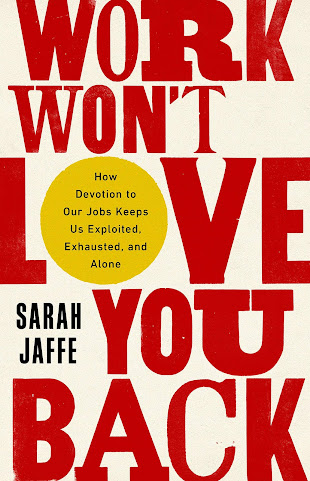Work has increasingly erased any hope for rest, pleasure, and fulfillment.
Perceptions might be at variance but there is nothing like a good work anymore. Far from making life less miserable, all kinds of gainful economic engagements have helped work to worm its way deeper into every facet of our lives. Reason enough for work to have increasingly erased any hope for rest, pleasure, and fulfillment. Behind the facade of a forced smile at workplace, stress, depression and anxiety remains curiously concealed. With climate crises, imminent automation and persistent pandemic knocking at the door, more and more workers are likely to remain exploited, exhausted, and finally abandoned.
Is it as serious as it gets? Perhaps even more, as independent journalist Sarah Jaffe unveils the work life stories of diverse occupations – from domestic workers to museum staffers and from social workers to tenured professors – to conclude that the labor-of-love myth is cracking under its own weight. With wages stagnant and cutbacks common, neo-liberalism has heaped punitive punishment on those who fail to comply. ‘We are all locked into a system of production in which we must work in order to survive, even as production needs fewer actual hands than ever.’ Can a society where we must work the majority of our waking hours ever deliver us happiness?
Jaffe has produced an indispensable writing on labor history, tracking changes from the factory-based work for a pay-cheque during 20th century to the present-day internet-driven market of cheap labor that has conveniently replaced flexibility and freedom with uncertainty and anxiety at the workplace. Long gone is the ‘Fordist Compromise’ that gave workers some luxury of free time and holidays. It is much different now, failure to not earn enough or dissatisfaction with the job owes a personal explanation – you must have made the wrong choices or not be making the most of opportunities. The only answer is to work harder on yourself or to leave.
Work Won’t Love You Back could not have come at a better time, as the pandemic has redefined the workplace while attaching some value to human emotions. With sudden space for us to think about a new normal, it is time desire for happiness is integrated into work and workplace. How much work can we, and our environment afford? Massive reductions in working time are not only desirable for our well-being but for the environment that we inhabit. Jaffe raises serious concerns on society’s stubborn perception on work and productivity, which has only undervalued human dignity and ecological values. Without doubt, the world ought to be less hostile.
There is a common thread that binds the detailed case studies of workers in the book, questioning the whims of capitalist ideology which places growth and consumption on priority over jobs and the environment. Written with panache and empathy, Work Won’t Love You Back is an immensely readable book that seeks to set an agenda for public discourse on contesting how indeed we are put to work. Citing recent spurt in unionization and protests across the world, Jaffe projects a measured but optimistic outlook for the rising tide of organized labor as a check on unprecedented corporate power.
Can the rhetoric of love-as-you-toil-at-work be sustained to reinforce emotional attachment and justify oppressive working conditions? Such are the overarching implications that the things we create under a capitalist society are never really ours, neither to keep nor to share. For Jaffe, this raises fundamental questions on the most painful realities of working-class life and seeks search for innovative futures built on care, rather than exploitation. She doesn’t have a ready prescription though, but seeks a renewed political understanding which acknowledges that our lives are ours, and creating conditions for a far better society isn’t preposterous.
Work Won’t Love You Back is discerning journalism at its best, a collective conversation on the meaning of work and life. Convinced that neo-liberalism as a project is collapsing, Jaffe gives a clarion call to workers of all hues to envision a society with a human face, the one that cares. ‘To ask for capitalism to pay for care is to call for an end to capitalism’. There is no denying that we have to do our jobs for a living, but nothing stops us from making demands for better conditions; alongside a claim on our time. Loving work should become a luxury that everyone can afford?
Jaffe’s provocative title is no less reflective in its contents. It asks questions that a majority has been whispering onto itself. Big in its scope, ambition, and impact, Work Won’t Love You Back asks the working class to express solidarity against the expropriation of bodies, minds, and spirits. Highly recommended, it is an elegant writing on a subject that concerns us all.
by Sarah Jaffe
Bold Type Books, New York
Extent: 418, Price: US$30

